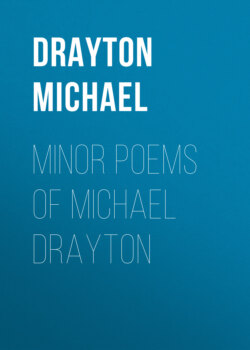Читать книгу Minor Poems of Michael Drayton - Drayton Michael - Страница 5
На сайте Литреса книга снята с продажи.
ОглавлениеThy Bowe, halfe broke, is peec'd with old desire;
Her Bowe is beauty with ten thousand strings. …
are rare enough. Drayton, in fact, comes as near controverting the statement Poeta nascitur, non fit, as any one in English literature: by diligent toil and earnest desire he won a place for himself in the second rank of English poets: through love he once set foot in the circle of the mightiest. Sincere he was always, simple often, sensuous rarely. His great industry, his careful study, and his great receptivity are shown in the unusual spectacle of a man who has sung well in the language of his youth, suddenly learning, in his age, the tongue spoken by the younger generation, and reproducing it with individuality and sureness of touch. It is in rhetoric, splendid or rugged, in argument, in plain statement or description, in the outline sketch of a picture, that Drayton excels; magic of atmosphere and colouring are rarely present. Stolidity is, perhaps, his besetting sin; yet it is the sign of a slow, not a dull, intellect; an intellect, like his heart, which never let slip what it had once taken to itself.
As a man Drayton would seem to have been an excellent type of the sturdy, clear-headed, but yet romantic and enthusiastic Englishman; gifted with much natural ability, sedulously increased by study; quietly humorous, self-restrained; and if temporarily soured by disappointment and the disjointed times, yet emerging at last into a greater serenity, a more unadulterated gaiety than had ever before characterized him. It is possible, but from his clear and sane balance of mind improbable, that many of his light later poems are due to deliberate self-blinding and self-deception, a walking in enchanted lands of the mind.
Of Drayton's three known portraits the earliest shows him at the age of thirty-six, and is now in the National Portrait Gallery. A look of quiet, speculative melancholy seems to pervade it; there is, as yet, no moroseness, no evidence of severe conflict with the world, no shadow of stress or of doubt. The second and best-known portrait shows us Drayton at the age of fifty, and was engraved by Hole, as a frontispiece to the poems of 1619. Here a notable change has come over the face; the mouth is hardened, and depressed at the corners through disappointment and disillusionment; the eyes are full of a pathos increased by the puzzled and perturbed uplift of the brows. Yet a stubbornness and tenacity of purpose invests the features and reminds us that Drayton is of the old and sound Elizabethan stock, 'on evil days though fallen.' Let it be remembered, that he was in 1613, when the portrait was taken, in more or less prosperous circumstances; it was the sad degeneracy, the meanness and feebleness of the generation around him, that chiefly depressed and embittered him. The final portrait, now in the Dulwich Gallery, represents the poet as a man of sixty-five; and is quite in keeping with the sunnier and calmer tone of his later poetry. It is the face of one who has not emerged unscathed from the world's conflict, but has attained to a certain calm, a measure of tranquillity, a portion of content, who has learnt the lesson that there is a soul of goodness in things evil. The Hole portrait shows him with long hair, small 'goatee' beard, and aquiline nose drawn up at the nostrils: while the National portrait shows a type of nose and beard intermediate between the Hole and the Dulwich pictures: the general contour of the face, though the forehead is broad enough, is long and oval. Drayton seems to have been tall and thin, and to have been very susceptible of cold, and therefore to have hated Winter and the North.[25] He is said to have shared in the supper which caused Shakespeare's death; but his own verses[26] breathe the spirit of Milton's sonnet to Cyriack Skinner, rather than that of a devotee of Bacchus.
He died in 1631, possibly on December 23, and was buried under the North wall of Westminster Abbey. Meres's[27] opinion of his character during his early life is as follows: 'As Aulus Persius Flaccus is reported among al writers to be of an honest life and vpright conuersation: so Michael Drayton, quem totics honoris et amoris causa nomino, among schollers, souldiours, Poets, and all sorts of people is helde for a man of uertuous disposition, honest conversation, and well gouerned cariage; which is almost miraculous among good wits in these declining and corrupt times, when there is nothing but rogery in villanous man, and when cheating and craftines is counted the cleanest wit, and soundest wisedome.'[28] Fuller also, in a similar strain, says, 'He was a pious poet, his conscience having the command of his fancy, very temperate in his life, slow of speech, and inoffensive in company.'
In conclusion I have to thank Mr. H.M. Sanders, of Pembroke College, Oxford, for help and advice, and Professor Raleigh and Mr. R.W. Chapman for help and criticism while the volume was in the press. Above all, I am at every turn indebted to Professor Elton's invaluable Michael Drayton,[29] without which the work of any student of Drayton would be rendered, if not impossible, at least infinitely harder.
CYRIL BRETT.
Alton, Staffordshire.
